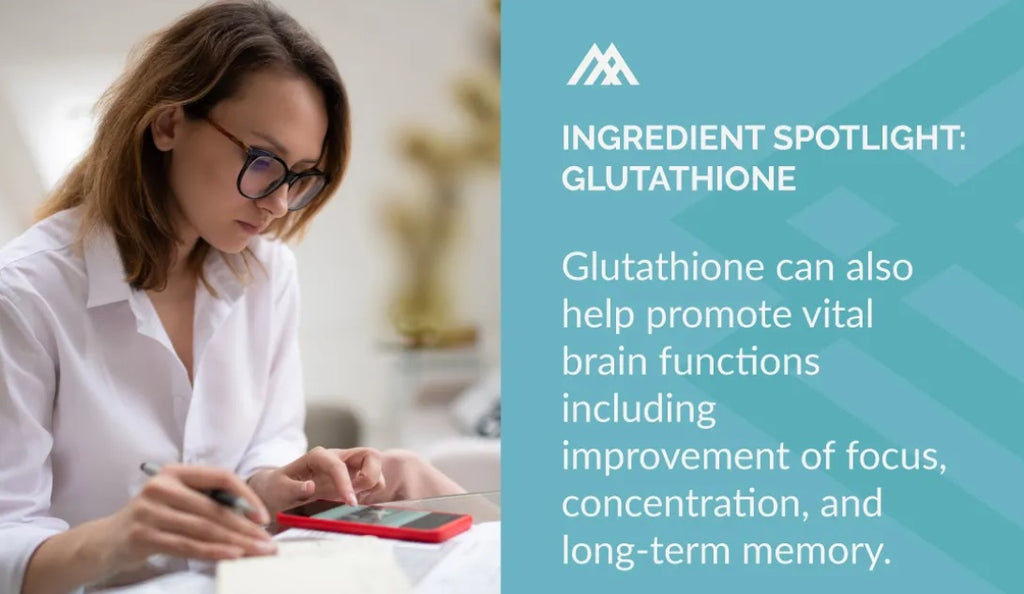Your Cart is Empty

July 17, 2020 7 min read
Glutathione, the master of all antioxidants, plays a critical role in the proper functioning of our bodies. Fortunately, when we are young, our bodies produce enough glutathione. However, aging, poor diet, toxins, stress, and environmental factors cause our glutathione levels to diminish, resulting in potential health decline. This may sound depressing, but incorporating glutathione supplements into your daily diet and routine can help manage your glutathione levels.
Today we will dive deep into some frequently asked questions so that you are well informed and confident in your decision to include glutathione supplements in your diet.
Take our quiz and find which supplements your body is craving.

Let's start with the basics. Glutathione is a funny-looking word that can be easy to mispronounce. No worries, we've got you! Glutathione is pronounced GLOO-tuh-thay-ohn. Practice saying it a few times out loud, then wow your friends with your extensive knowledge about this amazing antioxidant.
Glutathione is a tripeptide composed of three essential amino acids: glutamine, glycine, and cysteine, naturally produced by every cell found in the body.

Absolutely. Glutathione is safe and vital for optimal body function. Boosting your glutathione levels is safe and helps ensure that your body is equipped and functioning properly.
Even with a healthy lifestyle, we are regularly exposed to pollutants, toxins, and radiations from food, the environment, and the many electronics we encounter throughout the day. Glutathione helps protect your body against the accumulation of toxins and pollutants that can cause several conditions such as diabetes or dementia.

This is a great question. Increasing your glutathione levels can be done through diet, IV, and orally as a glutathione supplement. However, it is worth mentioning, receiving glutathione through IV is an effective practice of the past. It is a weekly treatment that comes with considerable financial costs and time costs. Being such a high involvement treatment, many people who needed a glutathione boost were not really able to commit, making oral supplements an easier option.
Symptoms of glutathione deficiency may vary from person to person. However, below are a few common symptoms found in people who have low glutathione levels:
Glutathione levels can be tested through the Red Blood Cells (RBC). Maintaining proper glutathione levels is vital for the body to function correctly. If you have concerns about your glutathione levels, we suggest talking to a professional about receiving the Red Blood Cell Glutathione test.
Everyone can benefit from glutathione. It is a strong defense in the body and is found in every cell in our bodies. Taking glutathione not only increases your glutathione levels but also maintains your healthy levels of glutathione. As we age, our glutathione levels begin to decrease, sometimes rapidly, which makes it extremely important to make sure you are incorporating glutathione supplements into your diet. Remember, glutathione works actively to detox the body, build DNA, and support other important body functions.
It’s always the perfect time to incorporate Glutathione into your life. If you are elderly and want to make sure your glutathione levels are high so that your body can operate optimally, incorporating glutathione supplements is a great choice. As with any new supplement, we encourage you to consult with your doctor before starting.
While it is always important to consult with a doctor, it is generally safe to continue to boost your glutathione levels, even if a person is very ill. Besides, glutathione deficiency is one less problem to worry about. However, if you are suffering from a severe illness, please discuss this with your doctor before taking anything outside of what is prescribed to you.
We are glad to hear you are healthy! We encourage proactive and preventive care rather than reactive. This means it is important to take care of your body even when it is healthy instead of waiting for a health concern to appear. Maintaining your healthy levels of glutathione is a wise way to ensure that you do not experience glutathione deficiency. Besides, we all get sick from time to time, and glutathione helps boost the immune system and fight off infection. It is an excellent tool to have in your back pocket, even if you are already healthy and fit.
While you may be taking glutathione for its antioxidant properties, detoxification properties, and ability to protect you from the effects of harmful radiation, you can also expect to experience other positive benefits from taking Glutathione, including:

While liposomal glutathione is safe for most individuals, rare exceptions include the following side effects:
Amandean Glutathione is made with optimally-sized liposomes for the highest absorption. A liposomeis a sphere-shaped vesicle made up of one or more phospholipid bilayers, which resembles the structure of cell membranes. Liposomes have become an advantageous and effective way to deliver nutrients and supplements into the body. Simply, they are the most bioavailable formula for our bodies to use effectively because they bypass the digestive system and go directly into the cells.
Amandean Liposomal Glutathione is selectively sourced and made with gold standard Setria Glutathione from Japan, ultra-pure water, and phosphatidylcholine (PC) from non-hydrogenated sunflower lecithin. Our advanced liposomal technology offers maximum bioavailability. Our product includes non-GMO sunflowers, soy-free, sugar-free, vegan friendly and is cGMP Certified.
To easily incorporate Amandean Liposomal Glutathione, we recommend mixing 1 teaspoon of your Liposomal Glutathione into a tasty juice or smoothie. If you do choose to add to your smoothie, be sure to mix in after the smoothie is already blended ---the blending process can damage the liposomes. Glutathione has a sulfuric taste, so you'll want to balance that flavor with some sort of fruity flavor. Glutathione should be added into cold and refreshing drinks and never hot liquids, as heat can also destroy liposomes. For maximum absorption, taking on an empty stomach or in between meals is the best practice.
We suggest taking ¾ Teaspoon of Liposomal Glutathione daily in between meals or on an empty stomach or as directed by your doctor.
You can begin including Liposomal Glutathione into your daily diet at any time. Whether your glutathione levels are high or low, managing your glutathione levels is very important. Consult with a doctor if you are pregnant, breastfeeding, or have any additional conditions.
Once you have Liposomal Glutathione and are ready to incorporate into your diet, take daily in between meals or on an empty stomach for maximum absorption.
In addition to taking Liposomal Glutathione supplements, you can source glutathione from many dietary sources such as raw fruits and veggies, unprocessed meats, eggs and foods rich in sulfur.
At Amandean, we want you to feel well informed and understanding of our products and ingredients. It is important for the health of the body to ensure that it is receiving the necessary nutrients for optimal performance. Our goal is to provide all-natural, super-healthy nutritional enhancements to as many people as possible. We believe in providing our customers with selectively sourced ingredients from nature's finest sources. Liposomal Glutathione has a heap of benefits and can be incorporated into your daily routine at almost any point in your health journey. It works hard to protect, cleanse, and boost your body’s performance one day at a time.
Glutathione is a naturally produced in our bodies, but its production decreases as we age.
Glutathione is a tripeptide responsible for DNA structure, immune health and combating free radicals.
Low levels of glutathione are associated with oxidative stress, cell mutation, and the inability of the body to detoxify itself.
The most effective and convenient way to maintain optimal glutathione levels is through supplementation.
Glutathione is recommended for everyone, including the elderly and those with serious health conditions.
Liposomal Glutathione delivers the antioxidant in the form of optimally-sized liposomes for a higher absorption rate.

May 14, 2024 8 min read

May 07, 2024 6 min read

May 07, 2024 6 min read